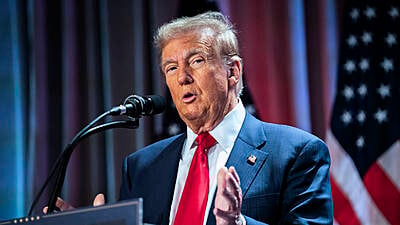Donald Trump has pledged to slash corporate tax and impose tariffs on trading partners, posing a potentially major threat to the Irish economy.
Ireland is heavily dependent on the taxes and jobs of a cluster of US tech and pharmaceutical multinationals. However, key advisors to the US president-elect have been explicit about how they want to disrupt the economic model that Ireland has benefitted from in recent decades.
Mr Trump's pick for role of Secretary of Commerce, Howard Lutnick, has even name-checked Ireland as having a "nonsense" trade surplus with the US.
If approved by the US Senate into the role, Mr Lutnick will be in charge of imposing the sweeping tariffs Mr Trump pitched to American voters during the election.
So how big is the threat to the Irish economy and what do economists predict will happen?
Ireland's trade with the US
The US plays an outsized role in the Irish economy.
According to the Central Statistics Office, the US was Ireland’s largest market for goods in 2023, with €54 billion in exports.
The US accounted for 28 per cent of the total value of exports, well ahead of Germany, the Republic's next-largest market.
Medical and pharmaceutical products and organic chemicals valued at €36 billion made up two-thirds of the total exports to the US last year.
All of this gives Ireland a signficant goods trading surplus with the US, meaning the value of Irish exports to the US is greater than imports from the country.
Last year the value of goods exports was over twice the value of imports, giving a trading surplus of €31 billion with the US.
That was down on 2022 when Ireland had a €40 billion goods trade surplus with the US.
However, figures from this year show that surplus growing again, with monthly data revealing an increase in the trade surplus compared with 2023.
Ireland's goods trade surplus will no doubt be on the radar of the incoming Trump administration.
Mr Trump has a particular interest in his country's trade balance – he imposed some tariffs during his first presidential term in an attempt to reduce the US goods trade deficit, which he regards as intrinsically bad for the country in profit-and-loss terms.
He has already promised to impose a 25 per cent tax on all products entering the country from Canada and Mexico, and an additional 10 per cent tariff on goods from China. Mr Trump said he would sign an executive order imposing the new tariffs on his first day in office.
Last week he said the European Union should step up US oil and gas imports or face tariffs on the bloc's exports.
The Irish government could, however, point Mr Trump to Ireland's trade in services with the US, which goes in the opposite direction and shows a large surplus for the US.
In fact Ireland's services trade deficit with the US was the largest in the EU in 2022, valued at more than €130 billion.
Corporation taxes
Another interest of the incoming Trump administration will be Ireland's growing take of corporate taxes paid by US firms.
An article that featured on the front page of the Wall Street Journal last month said the Republic's big budget surpluses were due to the US tax system blowing "a windfall into Ireland".
The Irish government is "rolling in clover" and has become "unbelievably rich," the conservative-leaning newspaper said, citing the two sovereign wealth funds and the cost of the new National Children's Hospital as signs of the State's largesse.
It is true that Ireland now has one of Europe's healthiest sets of public finances, mainly thanks to a surge in corporate tax revenues paid by a handful of large US multinationals.
Officials are projecting a massive €25 billion surplus this year and €12 billion in 2025, which comes on the back of €8 billion surpluses in the previous two years.
That is in stark contrast to the State's economic situation in the wake of the financial crash, when governments posted deficits running into the tens of billions over several years.
Corporation tax returns are expected to be more than €35 billion this year, which is “far in excess” of previous Department of Finance projections.
Ten US multinationals account for 60 per cent of these corporate tax receipts, with Microsoft thought to be the single biggest contributor.
Any change in tax policy under the Trump administration could have a major impact in Ireland.
Fine Gael leader Simon Harris said the country could lose €10 billion in corporate tax if just three US multinationals were repatriated to America under a hostile Trump administration.
“I’m not pre-empting it, I’m not saying that’s going to happen, I’m not predicting it, but that is the level of risk that our economy is exposed to,” Mr Harris said during the election campaign last month.
Predictions
Despite the clear risks to Ireland, many economists are cautious in their predictions for the year ahead.
The Central Bank of Ireland said any changes by the Trump administration could affect employment in companies here, hit future investment decisions and corporation tax.
"As the US is Ireland's largest bilateral trade partner the direct exposure of the economy and public finances to changes in US economic policy is material," the bank said in its most recent quarterly bulletin.
It added Ireland was "particularly susceptible to changes in US policy".
Central Bank governor Gabriel Makhlouf said the outlook for 2025 was clouded as the actions of Mr Trump were all but impossible to read.
He told the Financial Times that it was unclear if Mr Trump was really serious about tariffs, or if his threat was just a bargaining strategy to achieve other policy goals.

Trade economist Dr Rebecca Harding took a similar view, writing in an analysis for Deutsche Bank that there was a strong likelihood that this was a negotiating tactic from Mr Trump.
"It is possible that the new US administration will not be that different in terms of direct action to its predecessor," she said.
William Reinsch, a trade expert at the Center for Strategic and International Studies, said the statement from Mr Trump urging European countries to buy more US oil and gas means the EU could negotiate its way out of tariffs.
"This could be a win-win, telling them to buy something they want and need anyway," Mr Reinsch told Reuters.







